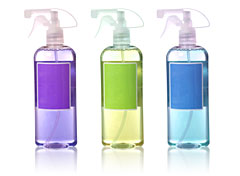Dear Umbra,
I’ve noticed lately that Method cleaning products are now being sold in a number of different retail outlets, whereas before they were only sold in Target. This shouldn’t seem too weird in our every-store-sells-the-same-thing world, but seeing these products on the shelves in Whole Foods got me wondering more about them. You see, I went looking for some trusty Bon Ami cleaner the other day and found it gone from the shelves and many Method products in its place. The Method stuff seems a little too good to be true (though they don’t seem to offer an elbow-grease product like Bon Ami in their line). Maybe it’s the slick packaging; maybe I’m just a cynic. Is it really true that such a positive cleaning product is being sold in big retailers around the country? Are there any bad things we should know about these products? Thanks!
Micha M.
Tucson, AZ
Dearest Micha,

A madness to your Method?
You are far from the only cynic among us. I have also given Method the gimlet eye. Method products have become omnipresent, the bottles look good, yet I’ve never noticed any green claims. My cynicism feels a little deflated after researching your question: I can’t seem to find anything bad about Method merchandise. Of course, I’m not without a bit of advice regarding the complete line of Method products. But I’ll give said advice at the end. First, let us celebrate what seems to be the mainstreaming of environmentally-better products. We pick Method for the first round of applause, but that’s only our latest example. Tom’s of Maine and Burt’s Bees, mentioned months ago, are everywhere I look. Target, the store you mention, not only carries the Method brand but also is reducing its use of PVC. Just a few brief reasons out of many for celebration.
In no way should this rejoicing certify the effectiveness of Method — I have read a review by Grist’s Sarah v., and I’ve checked out the Green Guide, which does approve of Method’s cleaning power. I, however, have never used Method products. To inspect their bonafides, I looked at the company website, which is filled with cute humor and very thorough FAQs. Method claims to ne’er use phthalates, parabens, ammonia, triclosan [PDF], or to test on little animals (these are all bad things, in case you’ve never heard of them). Then it claims that it’s assessed by the EPA (true) and, even better, by a European organization that uses cradle-to-cradle methodology (basically, nothing becomes waste). That’s true, too. All this sounds like a giant Method infomercial. Instead, please interpret it as a consumers-make-a-difference infomercial. There is no way the two young (environmentalist) fellows who started this company would have been able to infiltrate Target if the ecological shoppers weren’t known to be there, waiting to buy less-awful cleaning supplies. Yay.
In the context of this celebration, here is my actual environmental advice regarding all cleaning products: Beware of buying stuff you don’t actually need. Yes, we need to purchase cleansers made without known poisons and pollutants, and we need laundry detergent, dish soap, and maybe dishwashing liquid. But almost all of our other general household cleaning needs can be met with soap, white vinegar, baking soda, borax, a sponge, scrubby, and a pile of old T-shirts. Individual grapefruit-scented wipes (non-toxic and bamboo-based or otherwise) are, basically, silly. They’re probably very nice-smelling and convenient, but there’s no call for a one-use wipe (30 for $4 from Method) when a sponge will probably do the trick. What I’m saying is, watch out for getting sucked into the shopping vortex, a place where convenience and enticing packaging suddenly erase all our heartfelt commitment to reduce.
Air fresheningly,
Umbra
